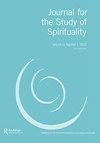和平与灵性:“神学幼儿园”
IF 0.8
0 RELIGION
引用次数: 0
摘要
本文探讨了我们内心的平静和灵性是如何联系在一起的。它首先非常简单地提到了“正念”和“警觉”,然后阐述了伊芙琳·安德希尔(1875-1941)的信件中提出的一种不同的沉思方法,伊芙琳·安德希尔是二十世纪上半叶一位重要的精神作家。在第二次世界大战期间,昂德希尔写信给一群自称为“神学幼儿园”的妇女,概述了在战争混乱中保持内心平静的精神实践。昂德希尔认为,战争的根源在于精神领域,应该在那里战斗,所以她鼓励妇女们从事“精神战争工作”,为独裁者祈祷。她鼓励妇女们养成每天沉思祈祷的节奏,并对精神著作和礼拜仪式进行冥想,以帮助她们获得内心的平静。昂德希尔还鼓励妇女们试着接受她们的痛苦,并把目光投向永恒,同时警惕并期待上帝的干预。他们还强调休息和自我照顾,以及限制接触战争新闻。当前的COVID-19大流行通常被称为对抗无形敌人的“战争”。昂德希尔在战争期间向“神学幼儿园”推荐的精神实践和姿势,为我们在当前不确定的时期培养和维持内心的平静提供了见解,因为我们生活在新冠疫情中,加上战争和战争谣言带来的全球不安全感。本文章由计算机程序翻译,如有差异,请以英文原文为准。
Peace and spirituality: ‘The Theological Kindergarten’
ABSTRACT This article explores how our inner peace and spirituality are linked. It begins by very briefly mentioning ‘mindfulness’ and ‘watchfulness’, then expounds a different contemplative approach set out in the letters of Evelyn Underhill (1875–1941), a significant writer on spirituality in the first half of the twentieth century. During the Second World War, Underhill wrote to a group of women who named themselves ‘The Theological Kindergarten’, outlining spiritual practices for maintaining inner peace amidst the chaos of war. Underhill believed the roots of war lie in the spiritual realm and should be fought there, so she encouraged the women to undertake ‘spiritual war-work’, praying for the dictators. She encouraged the women to develop rhythms of daily contemplative prayer and meditation upon spiritual writings and liturgy to help them gain inner peace. Underhill also encouraged the women to try to accept their suffering and look beyond it to Eternity as well as being alert and expectant of God’s intervention. Rest and self-care were also emphasised, plus limiting exposure to war news. The current COVID-19 pandemic has often been referred to as a ‘war’ against an invisible enemy. The spiritual practices and posture that Underhill recommended to the ‘Theological Kindergarten’ during wartime provide insights regarding the cultivation and maintenance of inner peace during our current uncertain times of living with COVID, plus our global insecurity with wars and rumours of wars.
求助全文
通过发布文献求助,成功后即可免费获取论文全文。
去求助
来源期刊

Journal for the Study of Spirituality
RELIGION-
CiteScore
2.50
自引率
7.10%
发文量
25
期刊介绍:
Journal for the Study of Spirituality is a peer-reviewed journal which creates a unique interdisciplinary, inter-professional and cross-cultural forum where researchers, scholars and others engaged in the study and practices of spirituality can share and debate the research, knowledge, wisdom and insight associated with spirituality and contemporary spirituality studies. The British Association for the Study of Spirituality (BASS) organises a biennial international conference and welcomes enquiries about membership from those interested in the study of spirituality in the UK and worldwide. The journal is concerned with what spirituality means, and how it is expressed, in individuals’ lives and communities and in professional practice settings; and with the impact and implications of spirituality in, and on, social policy, organizational practices and personal and professional development. The journal recognises that spirituality and spiritual values can be expressed and studied in secular contexts, including in scientific and professional practice settings, as well as within faith and wisdom traditions. Thus, Journal for the Study of Spirituality particularly welcomes contributions that: identify new agendas for research into spirituality within and across subject disciplines and professions; explore different epistemological and methodological approaches to the study of spirituality; introduce comparative perspectives and insights drawn from different cultures and/or professional practice settings; aim to apply and develop sustained reflection, investigation and critique in relation to spirituality and spiritual practices; critically examine the values and presuppositions underpinning different forms of spirituality and spiritual practices; incorporate different forms of writing and expressions of spirituality.
 求助内容:
求助内容: 应助结果提醒方式:
应助结果提醒方式:


